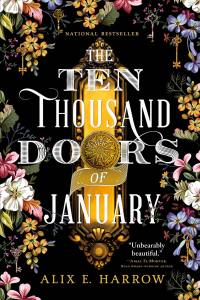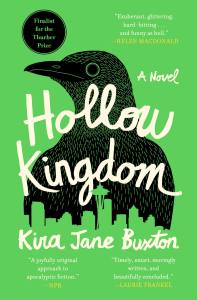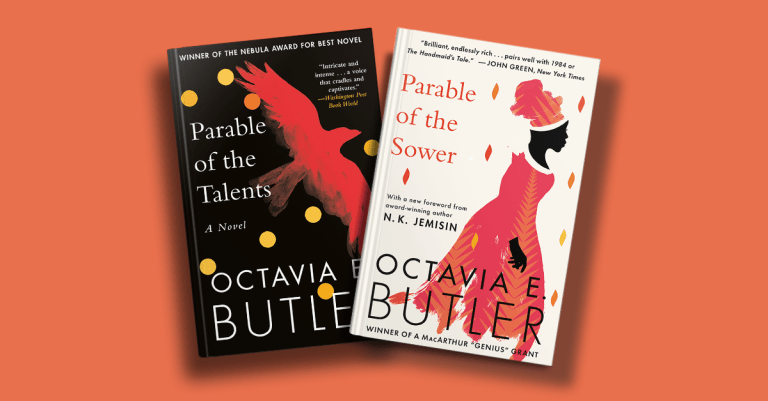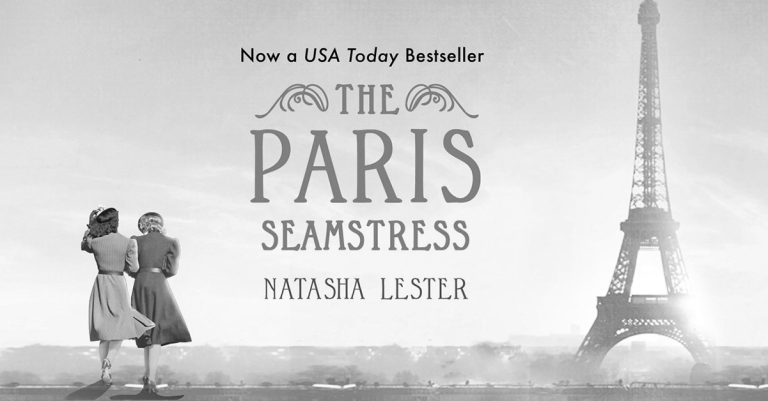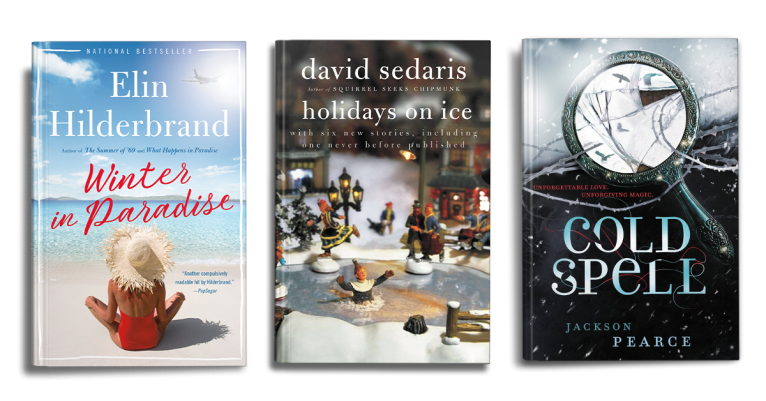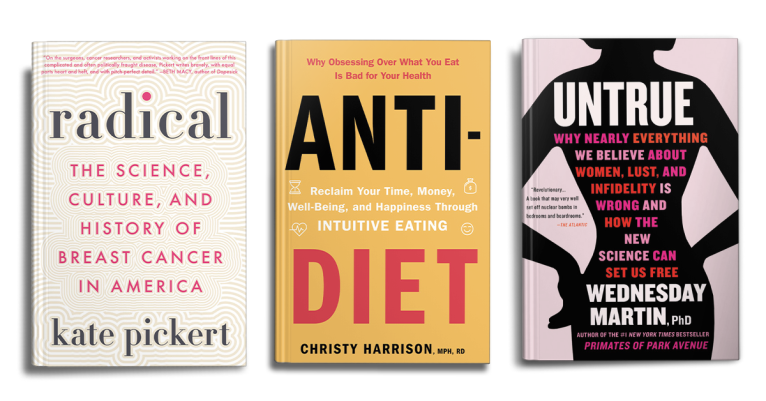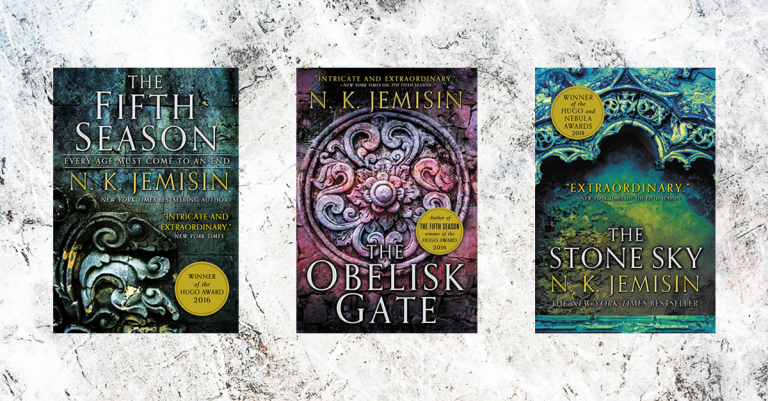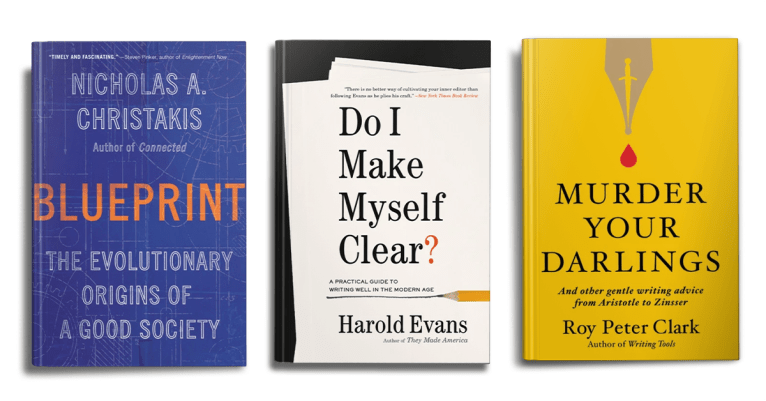Alix E. Harrow and Kira Jane Buxton Q&A
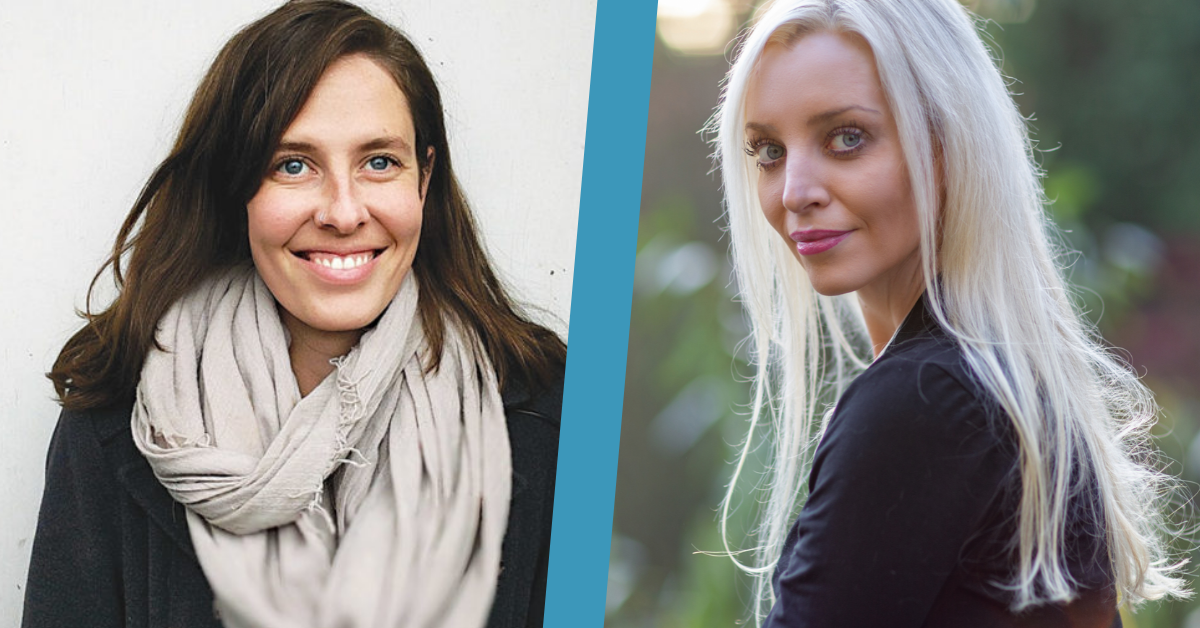
Alix E. Harrow: Hi Kira! I want to start by leaning across the digital table and telling you, with tears of devotion shining in my eyes, how much I loved Hollow Kingdom. It was so smart and weird and fresh and funny, and I feel lucky to have read it. Thank you for writing it.
It also surprised me. Nothing on the cover or marketing said the word zombies, and yet: zombies! Of all the apocalypses to choose from (biological plague, nuclear, climate-based, asteroid, alien invasion), why zombies?
Kira Jane Buxton: Thank you, that’s especially lovely to hear given how much I loved The Ten Thousand Doors of January! I read it ridiculously slowly because I didn’t want it to end!
Zombies, yes. I surprised myself with writing about zombies. I’m not particularly enamored of them, nor do I consider myself well-acquainted with the pantheon of zombie literature, but latterly I do understand why I chose them. I wanted to find a way to highlight environmental issues (loss of animal habitat, deforestation, climate change–mainly the anthropogenic destruction of the natural world) using an adventure story and humor to make its themes accessible. The zombies are never named “zombies” in the novel and I don’t consider them to be the focus either. They are rather allegorical. There’s a long-running tradition of zombies being used as a form of social critique and a stand-in for current societal anxiety (race relations, terrorism, consumer culture, war, etc.). I found it interesting to imagine that even in (relative) death, humans are still wreaking havoc on the earth. Also, maybe I kind of relate to them? I’m tired a lot and have a bit of a “lurching” gait.
Harrow: Zombies feel very firmly rooted in sci-fi or fantasy, to me. What’s your history with genre fiction? And how do you feel about the literary vs. speculative divide, more broadly?
Buxton: My previous novels (the novels in the drawer) are humorous mystery novels, so it was a bit of (another!) surprise that my first published novel wasn’t in the mystery genre. You know, when I wrote Hollow Kingdom, I had decided to give myself total freedom from expectation of publication, or hopes of landing an agent. I just wanted to write a wild story and enjoy every minute of the process. I think we’re seeing a lot more cross-genre novels and I think that’s a good thing. I don’t think it should be the author’s burden to worry about whether their work fits squarely in the “mystery” category as they create, for example, and I don’t see why a speculative novel can’t be literary. I’ve been describing Hollow Kingdom as a “humorous literary dystopian novel with some horror elements and nature writing.” Why not?!
Harrow: Like if John Muir wrote a novel after watching The Secret Life of Pets and World War Z. Yes.
Buxton: Wow. That might be my favorite description yet.
What are your thoughts on the literary speculative divide? Your writing is hauntingly beautiful (don’t get me started on your metaphors!), your prose is poignant and literary, and I’ve seen the genre listed as “coming-of-age fiction”, “fantasy fiction”, and “romantic fantasy.” Is that how you’d describe it?
Harrow: I like my genres like I like my borders: open, humane, and un-policed. My Mom shaped my reading life, and she was and remains a gigantic nerd (hi, Mom!) and also a writing professor. So we read both Tamora Pierce and Thoreau, we watched Roots and Star Trek: Voyager. There weren’t any rules or allegiances, there were just things we loved. I still approach media that way, and it bums me out when literary folks curl their lips at time-travel or space-wizards, or when genre fans act like literary folks aren’t allowed to touch their time-travel or space-wizards.
Buxton: Gah, this bums me out too.
Harrow: As far as labeling my own book–a very wise writer recently told me it wasn’t an author’s burden to worry about where our work fits on the shelves. (But it’s historical portal fantasy, with full helpings of Adventure and True Love and archives, because why not).
Buxton: One of the many things I loved about The Ten Thousand Doors of January is how well you explored deep themes. There are themes of race, inequality, colonialism, family dynamics, and heritage, amongst others. How did you navigate these themes so seamlessly? Were you ever worried about didacticism?
Harrow: I mean, look: if you’re writing about Western history, you’re writing about themes of race, inequality, and colonialism, whether you know it or not. I have a Master’s in history, and one of the things grad school taught me how to do was see the macro within the micro, the invisible inside the invisible. Like: something as vast and nebulous as British imperialism can be seen in something as seemingly-tiny as an advertisement for soap. So if I managed to incorporate those themes with any grace at all, it’s because I told the straight-up truth.
As far as didacticism, well: when you care a whole lot about something, when you pour your whole passion and labor into it, somebody is bound to accuse you of being preachy or teachy or annoying, particularly if you’re a woman and they aren’t. I didn’t worry about it too much.
What about you? Did you worry that readers might narrow their eyes, gripped by the sudden suspicion that you were telling them that unchecked capitalism and climate change were going to ruin our beloved planet?
Buxton: No. Hehehe. At the time I wrote it, I didn’t. At this point, the last thing I’m concerned about is a reader feeling inconvenienced by the Inconvenient Truth about our planet. There isn’t a more pressing issue than climate crisis (I stopped calling it “change” because I think the vernacular is important and there’s great power in our words). I’m more interested in reaching readers who are open to new ideas and thinking about these environmental issues in a new way. It’s depressing and paralyzing to talk about these issues, but it doesn’t have to be. Perhaps there are ways to approach it that aren’t so dire and devastating (this is partly why I use humor throughout the novel). Narrowed eyes don’t scare me, but climate crisis and what’s happening in the Anthropocene does.
I’d love to know how long it took you to write The Ten Thousand Doors of January? As I read it (and forgive me, I think I already sent you a fan message about this!) I had the glorious experience of being transported to other worlds in a whimsical way I hadn’t felt in a long time. It felt like when I read The Chronicles Of Narnia–admittedly a while ago now–quite spellbinding. I got the feeling that we might have shared the experience of filling our books with our interests (other worlds, animals, books, exploring injustice). What do you think?
Harrow: Oh, absolutely yes. There’s no way to read Hollow Kingdom without being aware that you are following a writer down her own very specific rabbit-hole, entering a Wonderland lovingly crafted of her favorite things.
I did the same thing with The Ten Thousand Doors. I love books and fairy-tales and footnotes and rambling estates full of gothic mysteries and stolen treasures; I love dogs and romance and ships sailing toward unknown horizons. I upended the whole bucket into a single book, and it seems to have worked.
Buxton: It most certainly did.
Harrow: Although it does sometimes make me frightened to think about the next thing I write. Like, I already poured my entire heart into a book-shaped mold–how do I find a second heart? Do you have any of those fears, or does your previous novel-writing experience give you more faith in yourself?
Buxton: Oh goodness, yes, I have all the fears. Part of the business of books is to put it out there and promote it and wear something other than sweatpants and be in a more public space, which means that people will be reviewing and giving their opinion of your “whole bucket of heart poured into a single novel.” That’s terrifying and a dichotomy, since the most essential part of our job is to sit in a room, chew the end of pencils and figure out how to kill imaginary beings (I oversimplify a little). I think it’s entirely natural and warranted to have fears about the next book not living up to the expectations set by its older sibling. I have to keep reminding myself that the most important part of this process is the writing itself, that it will always be about you as a writer and the page. Everything else has a place and a reason, but it’s not the reason. I remind myself that what worked about Hollow Kingdom was that I didn’t allow outside influence, and I just enjoyed the process and remembered why I write in the first place. I love it. I think it’s an extraordinary privilege to sit and create freely. And if it takes time to get back to that space, that’s okay too! It’s worth remembering that it’s always there, waiting for you, ready to start the dance again. And for what it’s worth, after reading The Ten Thousand Doors of January, it’s very clear to me that you have a second heart, and you’ll have a third heart, and a fourth, and many, many, many more hearts. I’ll stop here because this is beginning to sound like a Gandalf speech.
Can we talk about the true hero of the novel? I’d like to know everything about Bad, The Very Good Dog. Is he inspired by a real dog or another literary canine?
Harrow: Bad is a combination of my own dear Magellan–the scaredy-cat border collie I got in my last semester of college, who has lived with me in vans and tents and cabins and cramped apartments, who has remained true and faithful and cowardly for almost eleven years now–and the dog from Sinbad and Me by Kin Platt. It’s the perfect midcentury boy-and-his-dog mystery-adventure, and I love it to pieces.
Buxton: This sounds AMAZING. *leaves conversation to locate a copy of this whimsical novel* Magellan sounds like an angel. How lovely that you’ve experienced so much together. My own dog, Ewok, is ten and also cowardly. Sometimes, the fears seem reasonable (fireworks, trucks, elephant seals), and other times I’m not so sure (jangly keys, his own farts, when the beat drops in a song).
Harrow: And now, of course, we must talk about Dennis, the Very Best Dog. In particular, I’m curious about his silence. In a world of freely-talking animals, why did you choose to write a dog without a voice?
Buxton: I actually couldn’t hear his voice clearly in the beginning, and thought I’d wait for it to “come through.” Then I realized I was enjoying exploring the relationship between Dennis and S.T., which is not less of a relationship because we don’t hear Dennis speaking clearly. It meant I got to touch on the fact that not all language is verbal, and that our relationships with our own animals are complex and nuanced despite the linguistic gap. To me, it’s actually one of the most important parts of the book, because in voicing animals we don’t normally hear from, I hoped to inspire empathy and connection to them. The fact that Dennis isn’t as loquacious as the other characters and his character still shines through (and is apparently the favorite character of many readers) goes to show that we can have deep and meaningful encounters and connections with other species.
What’s the best part of having your book out in the world?
Harrow: That I never, ever have to read it again. A reader helpfully notified me of a typo and I had such a sense of blissful contentment as I deleted the email, because the book is done and edited and copyedited and printed and bound and I’m done with it. For someone who developed an early addiction to school, and the delicious sensation of turning in your final paper of the semester, it’s immensely satisfying.
(Or maybe the best part is seeing a waitlist on my book at my local library. That’s pretty rad). How about you? I saw a pretty thematically appropriate zoo party–what’s been the highlight of your debut experience?
Buxton: Library waitlist! Finishing forever! Ah, bliss. The book party at the Woodland Park Zoo was wonderful, my husband organized it and we had cocktails by the grizzly bears (dreams, they do come true!) I’ve loved getting to spend time with independent booksellers (magical unicorn people) which has been different as a writer than as a reader. No one has been kinder to me than indie booksellers. I’ve loved getting fan art from readers and hearing about people’s experiences with crows and other critters. Maybe the very best part is hearing that others care about the natural world and fiercely want to protect it. I’m making connections with people who are working in conservation or wildlife rehabilitation. It gives me hope. The best part is the hope.
Harrow: Here’s to hope for both of us and our wild, weird books, and for our entire wild, weird world! Which is, after all, the only one we’ve got. It’s been a pleasure talking with you, Kira.
Buxton: This has been an absolute treat! Thank you, Alix!
By clicking ‘Sign Up,’ I acknowledge that I have read and agree to Hachette Book Group’s Privacy Policy and Terms of Use
About the Authors:
Alix E. Harrow is an ex-historian with lots of opinions and excessive library fines, currently living in Kentucky with her husband and their semi-feral children. She won a Hugo for her short fiction, and has been nominated for the Nebula, Locus, and World Fantasy awards. Find her at @AlixEHarrow on Twitter.
Kira Jane Buxton’s writing has appeared in The New York Times, NewYorker.com, McSweeney’s, The Rumpus, Huffington Post, and more. She calls the tropical utopia of Seattle, Washington, home and spends her time with three cats, a dog, two crows, a charm of hummingbirds, and a husband.
LOS ANGELES TIMES BESTSELLER! Finalist for the 2020 Hugo, Nebula, Locus, and World Fantasy Awards.
In the early 1900s, a young woman embarks on a fantastical journey of self-discovery after finding a mysterious book in this captivating and lyrical debut.
In a sprawling mansion filled with peculiar treasures, January Scaller is a curiosity herself. As the ward of the wealthy Mr. Locke, she feels little different from the artifacts that decorate the halls: carefully maintained, largely ignored, and utterly out of place.
Then she finds a strange book. A book that carries the scent of other worlds, and tells a tale of secret doors, of love, adventure, and danger. Each page turn reveals impossible truths about the world and January discovers a story increasingly entwined with her own.
Lush and richly imagined, a tale of impossible journeys, unforgettable love, and the enduring power of stories await in Alix E. Harrow's spellbinding debut--step inside and discover its magic.
Praise for The Ten Thousand Doors of January:
"One for the favorites shelf... Here is a book to make you happy when you gently close it. Here you will find wonder and questions and an unceasingly gorgeous love of words which compasses even the shape a letter makes against a page."―NPR Books
"Devastatingly good, a sharp, delicate nested tale of worlds within worlds, stories within stories, and the realm-cracking power of words."―Melissa Albert, New York Times bestselling author
"A love letter to imagination, adventure, the written word, and the power of many kinds of love."―Kirkus
For more from Alix E. Harrow, check out The Once and Future Witches.
"The Secret Life of Pets meets The Walking Dead" in this big-hearted, boundlessly beautiful romp through the Apocalypse, where a foul-mouthed crow is humanity's only chance to survive Seattle's zombie problem (Karen Joy Fowler, PEN/Faulkner Award-winning author).
S.T., a domesticated crow, is a bird of simple pleasures: hanging out with his owner Big Jim, trading insults with Seattle's wild crows (i.e. "those idiots"), and enjoying the finest food humankind has to offer: Cheetos ®.
But when Big Jim's eyeball falls out of his head, S.T. starts to think something's not quite right. His tried-and-true remedies—from beak-delivered beer to the slobbering affection of Big Jim's loyal but dim-witted dog, Dennis—fail to cure Big Jim's debilitating malady. S.T. is left with no choice but to abandon his old life and venture out into a wild and frightening new world with his trusty steed Dennis, where he suddenly discovers that the neighbors are devouring one other. Local wildlife is abuzz with rumors of Seattle's dangerous new predators.
Humanity's extinction has seemingly arrived, and the only one determined to save it is a cowardly crow whose only knowledge of the world comes from TV.
What could possibly go wrong?
Includes a Reading Group Guide.
